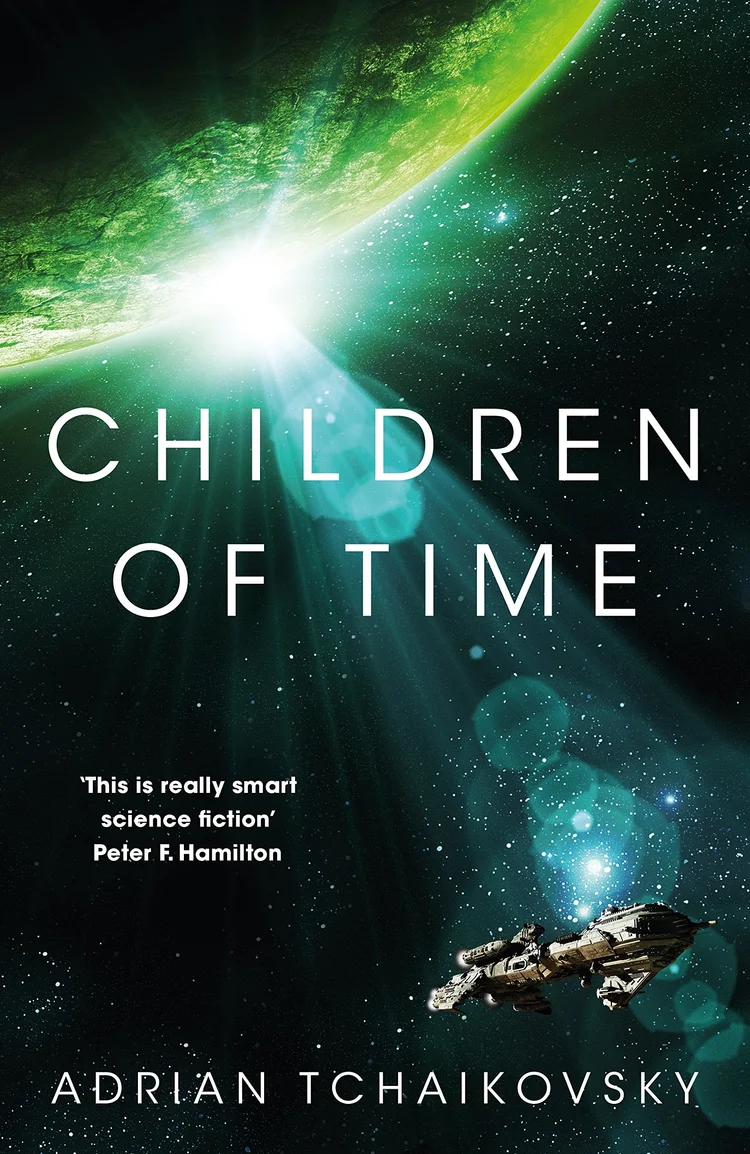Spiders! In! Space!
Adrian Tchaikovsky's Children of Time

In December, I put out a call for recommendations for standalone science fiction novels — in part to assemble a list for The Verge — but also because I was looking for something along those lines. I got a bunch of recommendations, but one that stood out was Adrian Tchaikovsky’s 2015 book, Children of Time. A friend of mine had already highly recommended the book, so I picked it up, and when we did a bit of traveling over the holidays, we listened to the audiobook. It’s a magnificent, epic story, and it’s well worth reading if you’re in the mood for book that deals with big ideas.
The story begins in the distant future. Humanity has begun to spread to the stars, and has enacted a variety of terraforming projects on several planets. Dr. Avrana Kern is the researcher overseeing the final efforts on a planet that she’s called “Kern’s World,” which has been made habitable for human life. She’s also about to kick off an experiment — two cargo capsules are to be dropped to the planet’s surface: one carrying a monkeys, the other a nanovirus that’s designed to uplift said monkeys in a handful of generations. It’s a grand experiment on evolution, and it goes drastically wrong when a crew member sabotages the mission, sending the monkeys to their doom. At the same time, a war breaks out on Earth, destroying space habitats and wrecking the planet’s surface. Kerns barely escapes, driven by the desire to oversee any hope that her experiment might work out.

That’s just the prologue. The story then jumps ahead. Remember those monkeys that were supposed to get uplifted? They burned up in the atmosphere, and the nanovirus jumped to another creature: a jumping spider. Tchaikovsky introduces a spider named Portia who has an uncanny realization while she’s hunting a larger spider — she can get help from others like her, and by working together, they’re able to get a tiny evolutionary foothold.
Tchaikovsky then jumps to another perspective: the crew of a human starship called the Gilgamesh, and a “classicalist” named Holsten Mason. Humanity, as it turns out, wasn’t wiped out completely in that war, but it was set back, with a new civilization blossoming on Earth during an ice age, only to realize that when the ice recedes, they’re going to be left with an uninhabitable rock. The survivors cobble together a generation ship, and set out into the depths of space, trying to find a new home. Mason is awoken a thousand years into the voyage, when they come across a beacon — Kern’s signal over her planet.
The novel alternates perspectives, first with a new generation of spiders, and then the crew of the Gilgamesh as they try and find a suitable place to set down. By shifting perspectives, Tchaikovsky shows off two things: the rise of the spiders, who are quickly evolving a sophisticated society as they overcome their neighbors, and figure out how to survive and thrive by coopting the skills and directing the evolution of other creatures, like ants and beetles. On the other hand, we see the downfall of the humans, who quickly devolve to an almost feudal society aboard the ship. They’re turned away by Kerns when they reach her world, and are directed to another, only to find that it’s unsuitable, and are forced to turn back in order to safe civilization.
Gerry Canavan (the scholar who spoke highly of the book) mentioned somewhere that he was reminded of Cixin Liu’s The Three-Body Problemhttps://bookshop.org/a/6134/9780765382030, and there are a lot of parallels between the two works. They’re both huge, epic stories of evolution and the rise and fall of civilizations, much in the mold of authors like Isaac Asimov, Arthur C. Clarke, or Frederik Pohl. Tchaikovsky builds on this trope by exploring a wide range of topics that complicate any civilization — gender roles (the spiders form a matriarchal society), and he flips arguments about sexism and culture nicely.
The juxtaposition between humans and spiders also plays out a larger story about how a culture is composed. Over the centuries, Kerns is deeply concerned with what she sees as failures of humanity: that they’re prone to warfare and balkanization, arguably poor footing and habits to extend out into space. We see that play out on the Gilgamesh as well — the ship’s captain becomes obsessed with his assigned task to shepherd humanity to safety, which causes its own problems as he works to keep the ship going, and as new generations of people appear over the millennia. By the end, the two cultures will have a pretty epic clash, and those differences force a resolution between the two. The book has shot to the top of my hypothetical “favorites” list.
Canavan compared the books to Three-Body Problem, and I’ll toss in another comparison: The Expanse. One of the things that’s attracted me to James S.A. Corey’s series is its focus on humanity’s tribalism and how we’ll likely bring some of our inherent issues with us if and when we begin to establish a foothold in space. Tchaikovsky doesn’t specifically look at racism in the same way that Corey does, but there’s a number of parallels that ultimately stack up to “humanity has the capability to improve itself, and it should.” Children of Time really makes a good argument that propagating out into space means that there are major issues that need to be addressed if humanity wants to survive long into the future — not necessarily in the depths of space, but here at home, too.
